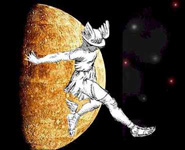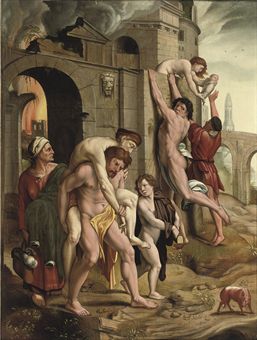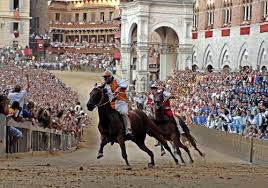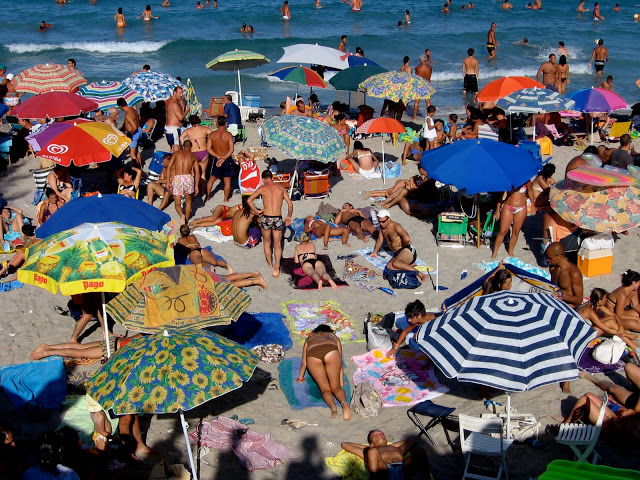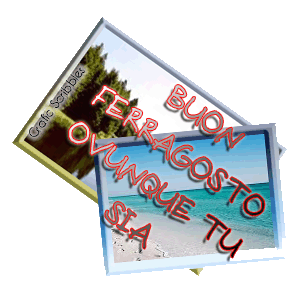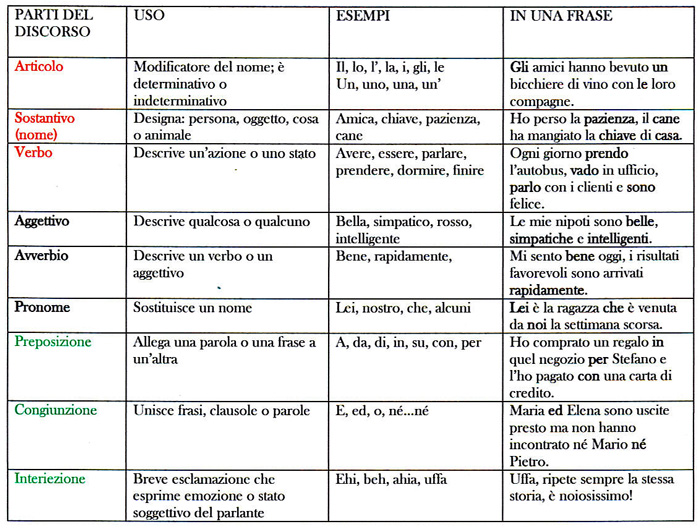
Page 9 includes June 14-21-28, July 5-12-19-25, Aug 2-9-16-23-30. Sept 6-13-20-27
2014
SALARIO E STIPENDIO (Parte I)
L’altro ieri uno studente mi ha chiesto qual è la differenza tra: salario e
stipendio.SALARIO: di solito indica la remunerazione del lavoro manuale
dipendente operaio, perlopiù operaio o bracciante agricolo (i cosiddetti
colletti blu);STIPENDIO: indica la paga mensile, sempre del lavoro dipendente,
però di natura impiegatizia o funzionaria (i cosiddetti colletti bianchi).Il Vocabolario etimologico della lingua italiana di Ottorino Pianigiani
(1991 Edizioni Polaris) ci fornisce queste definizioni:Salàrio fr. salaire; ingl. Salary: --lat. SALARIUM dal lat. SAL sale /con la
desinenza-ARIUM indicante attinenza/ (cfr. Salara), perché i magistrati e
i soldati romani ricevevano per loro nutrimento grani, vino, olio e
particolarmente sale; donde <<salàrium>> venne il loro soldo chiamato.
Col tempo, tali somministrazioni si compensarono in danaro, ma
conservarono il nome antico. [p.1185]Stipèndio – lat. STIPÈNDIUM per STI-PI-PÈNDIUM da STIPS – genit.
STIPIS – pesante moneta di rame d’infima qualità, che pare debba
riferirsi alla rad. STA-, STAP- esser saldo, solido /ond’anche la voce
stipes tronco, ceppo/ (v. Stare e cfr. Stipite) e così formato nella medesi
ma relazione d’idee del ted. Stüber soldo (cfr. Soldo): o PÈNDERE
pesare, e /quando al metallo greggio venne dopo Servio Tullio sostituita
la moneta coniata/ pagare, sborsare.
Dapprima significò la Paga dei soldati, ed oggi la Provvisione che si
dà a persone di qualità. Deriv. Stipendiare. [p.1861]...................................................................
SALARY AND PAY (Part I)
The day before yesterday, a student asked me the difference between:
salary and stipend.SALARY: usually refers to the remuneration for the work of the
dependent manual workman, mainly a laborer or field hand (the so-called
blue collars);PAY/STIPEND: refers to the monthly pay, also for dependent work,
however of a clerical or functionary nature (the so-called white collars);The Etymological Dictionary of the Italian Language by Ottorino
Pianigiani (1991 Edizioni Polaris) provides us with these definitions:Salary: because the Roman magistrates and soldiers received their
provisions in grain, wine, oil and especially salt, their coin was later
called <<salàrium>>. This compensation was later paid in money, yet
still maintaining the ancient name. *Pay/Stipend: the word derives from a heavy copper coin of very poor
quality (Stipis) plus the Latin word to weigh. The term was used at the
pay given to soldiers and later to persons of quality. **Please note that the translations are not verbatim.
Saturday, September 27, 2014
MAMMONE
Se controlliamo in vari dizionari disponibile on-line—per esempio:
Treccani.it, Garzanti Linguistica, ecc.—la definizione della parola
“mammone” è più o meno la stessa. Io preferisco la definizione di:Il Sabatini Coletti Dizionario della Lingua Italiana
[mam-mó-ne] s.m. (f. -na)
- • fam. Bambino o adulto che è eccessivamente attaccato alla madre
- • Anche in funzione di agg.: un bambino m.
- • a. 1967
Questi giorni sto rileggendo il romanzo del grande scrittore siciliano
Leonardo Sciascia A ciascuno il suo [Adelphi Edizioni, 1988, pp. 46-47] e
ci ho trovato una spiegazione molto più completa e poetica:
<< Per la sua vita privata era considerato una vittima
dell’affetto esclusivo e geloso della madre: ed era vero. A quasi
quarant’anni ancora dentro di sé andava svolgendo vicende di desiderio
e d’amore con alunne e colleghe che non se ne accorgevano o se ne
accorgevano appena: e bastava che una ragazza o una collega
mostrasse di rispondere al suo vagheggiamento perché subito si
gelasse. Il pensiero della madre, di quel che avrebbe detto, del giudizio
che avrebbe dato sulla donna da lui scelta, della eventuale convivenza
delle due donne, della possibile decisione di una delle due di non fare
vita in comune, sempre interveniva a spegnere le effimere passioni, ad
allontanare le donne che ne erano state oggetto come dopo una triste
esperienza consumata e quindi con un senso di sollievo, di liberazione.
Forse ad occhi chiusi avrebbe sposato la donna che sua madre gli
avesse portato; ma per sua madre lui, ancora così ingenuo, così
sprovveduto, così scoperto alla malizia del mondo e dei tempi, non era
in età di fare un passo tanto pericoloso. >>...................................................................
If we consult various online dictionaries—for example: Treccani.it,
Garzanti Linguistica, etc.—the definition of the word “mammone” is
more or less the same. I prefer the definition in:Sabatini Coletti Dictionary of the Italian Language
- • fam. A child or adult who is excessively attached to his mother
- • Also used as an adjective: un bambino m.
- • a. 1967
These days I’m rereading the novel by the great Sicilian writer Leonardo
Sciascia A ciascuno il suo (To Each His Own) and in it I found a much
more complete and poetic explanation:”In his private life he was considered a victim of his mother’s
exclusive and jealous affection, and it was true. At nearly forty years of
age, within him unfolded incidents of desire and love towards students
and colleagues, who either took no notice at all or barely noticed. It
was enough for a young woman or a colleague to react to his pipe
dreams for him to immediately freeze up. Thoughts of his mother, of
what she would say, of the judgment she would pass on the woman he
had chosen, of the eventual living together of the two women, of the
possible decision of one of the two to not have a life in common, always
intervened to extinguish the ephemeral passions, to distance the women
who had been the object, like after a sad consummated experience, and
therefore with a sense of relief, of freedom. Perhaps with his eyes
closed he would have married the woman his mother would have brought
him; but for his mother he, still so naïve, so inexperienced, so exposed
to the malice of the world and the times, he was not of the age to take
such a dangerous step.”Saturday, September 20, 2014
LE ORIGINI DEI NOMI DEI GIORNI DELLA SETTIMANA:
La parola “settimana” deriva da quella latina “septimana” (che significa:
in numero di sette). I nomi dei giorni furono assegnati dai Babilonesi
verso il VI a.C. ed ereditati dai Romani verso il II secolo a. C.. Queste
parole traggono origine dai corpi celesti in movimento fra le stelle fisse
che erano in sostanza gli elementi del sistema solare visibili a occhio
nudo: il Sole, la Luna e i cinque pianeti noti fin dall'antichità: Marte,
Mercurio, Giove, Venere e Saturno.LUNEDÌ: dal latino Dies lunae o giorno della luna. È il primo giorno
della settimana nel calendario gregoriano e il primo della settimana
lavorativa.
MARTEDÌ: dal latino Martis dies o giorno di Marte.MERCOLEDÌ: dal latino Mercurii dies ossia giorno di Mercurio.
GIOVEDÌ: dal latino Jovis dies, vale a dire giorno di Giove.
VENERDÌ: dal latino Veneris dies che significa giorno di Venere.
SABATO: ha due radici, la prima dal latino Saturni dies, il giorno di
Saturno. Il nome pagano del giorno dedicato a Saturno fu sostituito da
“sabato” dal termine ebraico Shabbat o Sabbat, in altre parole il giorno
di riposo. L’inglese ha mantenuto le radici originali in “Saturday”.DOMENICA: Anche il settimo giorno della settimana ha due basi.
Originalmente era il giorno del Sole, nome che si ritrova tuttora
nell’inglese “Sunday” e nel tedesco “Sonntag”. Dopo è stato sostituito
con il nome di “domenica” provvidente dal latino Dies Dominicus, che
significa giorno del Dominus (Signore), dall'Imperatore romano
Costantino (c. 272-337 d.C.) il quale si era convertito al Cristianesimo.THE ORIGINS OF THE NAMES OF THE DAYS OF THE WEEK:
In Italian, the word “week” derives from the Latin “spetimana” (which
means: in the number seven). The names of the week were given by the
Babylonians around the VI century BCE and inherited by the Romans
around the II century BCE. These words find their origins in the celestial
bodies in movement among the fixed stars which were in essence the
elements of the solar system visible with the naked eye: the Sun, the
Moon, and the five planets known from ancient times as: Mars, Mercury,
Jupiter, Venus, and Saturn.LUNEDÌ: from the Latin Dies lunae, the day of the moon. It is the first
day of the week in the Gregorian calendar and the first day of the work
week in Italy.
MARTEDÌ: from the Latin Martis dies, the day of Mars.MERCOLEDÌ: from the Latin Mercurii dies, the day of Mercury.
GIOVEDÌ: from the Latin Jovis dies, the day of Jupiter.
VENERDÌ: from the Latin Veneris dies, the day of Venus.
SABATO: has two roots: the first from the Latin Saturni dies, the day of
Saturn. The pagan name of the day dedicated to Saturn was substituted
by “sabato” from the Jewish word Shabbat or Sabbat, in other words the
day of rest. English has maintained the original “Saturday”.DOMENICA: even the seventh day of the week has two bases.
Originally it was the day of the Sun as can be found in the English
“Sunday” and in the German “Sonntag”. Later it was substituted with the
name “Domenica” from the Latin Dies Dominicus meaning the day of
Dominus (God) by the Roman Emperor Constantine (c. 272-337) who
was converted to Christianity.Saturday, September 13, 2014
8 settembre 1943, l'armistizio
detto anche l’Armistizio corto, fu firmato il 3 settembre a Cassabile
in provincia di Siracusa.Segue il testo del proclama del Maresciallo Pietro Badoglio,
trasmesso alle 19:45 alla radio (EIAR: Ente italiano per le audizioni
radiofoniche).
"Il governo italiano, riconosciuta la impossibilità di continuare l’impari
lotta contro la soverchiante potenza avversaria, nell’intento di
risparmiare ulteriori e più gravi sciagure alla nazione, ha chiesto un
armistizio al generale Eisenhower, comandante in capo delle forze
alleate anglo-americane. La richiesta è stata accolta.
Conseguentemente ogni atto di ostilità contro le forze anglo-
americane deve cessare da parte delle forze italiane in ogni luogo.
Esse però reagiranno ad eventuali attacchi di qualsiasi altra
provenienza".Il giorno seguente i giornali pubblicarono titoli di prima pagina <<LA GUERRA È FINITA>>,
ma l’Italia entrò in un periodo bruttissimo della sua storia: la fuga della famiglia reale e di
Badoglio, la liberazione di Mussolini, la creazione della Repubblica di Salò, lo sbandamento
dell’esercito italiano, l’invasione tedesca, e la lista continua. In altre parole: l’Italia che si
era unita con così tanti sacrifici nel 1860, si trovava di nuovo un paese diviso, invasa da
truppe straniere, sanguinante.
..................................................................September 8, 1943, the Armistice,
also known as the Short Armistice,
was signed on September 3 at Cassablie
in the province of Syracuse (Sicily).What follows is the body of the proclamation by Marshal
PietroBadoglio which was broadcast at 7:45 p.m. on EIAR,
the Italian National Radio:“The Italian government, recognizing the impossibility of continuing
the unequal struggle against an overwhelming enemy force, in order
to avoid further and graver disasters for the Nation, sought an
armistice from General Eisenhower, commander-in-chief of the
Anglo-American Allied forces. The request was granted.
Consequently, all acts of hostility against the Anglo-American forces
by Italian forces must cease everywhere. They (the Italian forces)
will react to eventual attacks from any other source.”The following day the newspaper headlines read: <<THE WAR IS OVER>>, however Italy
was to enter a very ugly period of its history: the flight of the royal family and Badoglio,
the liberation of Mussolini, the creation of the Republic of Salò, the confusion within the
Italian army, the German invasion, and the list goes on. In other words: the Italy that
had united itself with so many sacrifices in 1860, finds itself again a divided nation,
invaded by enemy troops, and bleeding.Saturday, September 6, 2014
MENTRE o DURANTE?
All’inizio dei loro studi, a volte i miei studenti hanno difficoltà con la differenza tra
gli usi di MENTRE e DURANTE. Guardiamo alcuni esempi:
Mentre è una congiunzione usata per esprimere: “nel tempo in cui, intanto che”. È
seguita da un verbo:
Mentre parlavo Luigi mi guardava fisso.
Il furto è successo mentre eravamo fuori casa a fare la spesa.
Mentre Elena studia, le piace ascoltare la musica.
Il bis è successo mentre suonavate l’ultima ballata.
Durante è una preposizione usata per esprimere: “nel tempo in cui, intanto che”. È
seguita da un sostantivo:
Durante dicembre, trascorriamo le vacanze natalizie con la famiglia di mia sorella.
Si sono annoiati durante il film.
Sandro ha perso il posto durante la crisi economica.
Molte persone innocenti sono morte durante la guerra.
At the onset of their studies, at times my students have trouble with the difference
between the uses of “MENTRE” and “DURANTE”. Let’s look at a few examples:
Mentre is a conjunction used to express: “at the time which, while”. It is followed
by a verb:
While I was speaking Luigi looked at me intently.
The robbery happened while we were out of the house shopping.
While Elena, studies, she likes to listen to music.
The encore occurred while you played your last ballad.
Durante is a preposition used to express: “at the time which, during”.
It is followed by a noun:
During December we spend our Christmas vacation with my sister’s family.
They got bored during the movie.
Sandro lost his job during the economic crisis.
Many innocent people died during the war.
Saturday, August 30, 2014
NOMI CON DUE FORME DI PLURALE—SECONDA PARTEAlcuni nomi maschili in -o hanno due forme di plurale, una regolare in -i (maschile) e
l’altra in –a (femminile). Nella maggior parte dei casi i due plurali hanno un
significato diverso. Ecco degli esempi e il loro significato.
1. il fondamento:
i fondamenti: in senso figurato: i principi di base e di sostegno di una
disciplina accademica o una scienza;
le fondamenta: con valore concreto: la parte sotterranea di una costruzione,
di un palazzo2. il frutto:
i frutti: in senso generico, i risultati
le frutta: le cose che si mangiano, come le mele, le albicocche3. il gesto:
i gesti: movimenti o atteggiamenti del copro, delle mani, delle braccia;
le gesta: imprese o azioni ammirevoli, come di un eroe4. il grido:
i gridi: quegli degli animali
le grida: degli esseri umani5. il labbro:
i labbri: in senso figurato: i margini di una ferita; i bordi di un vaso, o degli
animali;
le labbra: della bocca umana6. il lenzuolo:
i lenzuoli: più di una ma solo quando sono considerati uno ad uno
le lenzuola: un paio che si usano sul letto7. il membro:
i membri: quelli che fanno parte di una famiglia, di una commissione, di
un’associazione, di un partito;
le membra: le parti del corpo, sia umano che animale8. il muro:
i muri: di una casa
le mura: di cinta di una città o di una fortezza9. l’osso:
gli ossi: le parti ossee di animali macellati;
le ossa: l’insieme dell’ossatura umana
NOUNS WITH TWO PLURAL FORMS—PART TWO
1. Foundation:
masculine plural: in the figurative sense, of a science or an academic
discipline
feminine plural: in the concrete sense: of a structure2. Fruit:
masculine plural: the results
feminine plural: what we eat, like apples or apricots3. Gesture:
masculine plural: movements of the body
feminine plural: heroic feats4. Shout:
masculine plural: of animals
feminine plural: of humans5. Lip:
masculine plural: in the figurative sense, the edge or the margins of a street
or ditch
feminine plural: of humans6. Sheet:
masculine plural: more than one when considered one at a time
feminine plural: a set of sheets when used to make up a bed7. Member:
masculine plural: of a family, a political party
feminine plural: of the body8. Wall:
masculine plural: of a house
feminine plural: of a city or fortress9. Bone:
masculine plural: of butchered animals
feminine plural: human skeletal systemSaturday, August 23, 2014
Ferragosto, che deriva dal latino feriae Augusti (riposo di Augusto), fu stabilito nel
18 a.C. dall’imperatore Ottaviano Augusto. Era un periodo di riposo e di
festeggiamenti che aveva origini nelle tradizioni della Vinalia rustica o Consualia,
feste che celebravano la raccolta dopo la fine dei duri lavori agricoli; erano dedicate
a Conso, dio della terra e della fertilità.In tutto l’Impero si organizzavano feste e corse di cavalli, e gli animali da tiro,
liberati dai lavori nei campi, erano adornati di fiori. Infatti, il palio di Siena che è
celebrato il 16 agosto ha le sue radici in queste feste antiche. La parola “palio”
deriva dal latino pallium, una tela preziosa che era il premio dato ai vincitori delle
corse di cavalli. Inoltre, in questi giorni, i contadini facevano gli auguri ai
proprietari dei terreni, ricevendo in cambio una mancia.Oggi è tutt’altra cosa!
Ferragosto, based on the Latin Feriae Augusti (Augustus' rest), was established in
the year 18 BC by the emperor Augustus. It was a period of rest and festivity that
had its origins in Vinalia rustica or the Consualia, which celebrated the harvest after
the end of a long period of intense agricultural labor. The celebrations were
dedicated to Conso, the god of the earth and fertility.Throughout the Empire horse races were organized, and beasts of burden, freed
from their labors in the fields, were adorned with flowers. In fact, the Palio of
Siena which is celebrated on August 16th has its roots in these ancient festivals.
The word “palio” derives from the Latin pallium, a precious cloth which was the
usual prize given to winners of the horse races. Also, during this time, the farmers
greeted the landowners who in return would give them a tip.Today things are totally different!
Nel frattempo ……… Meanwhile……….
Saturday, August 16, 2014
Quando uno studente cerca nel vocabolario per la traduzione della parola “play”,
s’imbatte in una lunghissima lista di significati divisi tra sostantivi e verbi.
Esaminiamone alcuni!Iniziamo con i verbi:
I bambini giocano a calcio nel campetto qui vicino. (giocare)
A me piace giocare a bridge, ma tu preferisci gli scacchi. (giocare)
Il violinista suona un violino rarissimo. (suonare)
Piacerebbe partecipare anche a Giacomo. (partecipare)
Anna Magnani ha recitato la parte di Pina in quale film? (recitare)
Rappresentano “Sei personaggi in cerca d’autore” di Luigi Pirandello al Teatro
Centrale. (rappresentare)Finalmente sono riuscito ad avere un ruolo in quel nuovo film che stanno girando a
Cinecittà. (avere)Sto facendo vedere il nuovo DVD ai miei amici. (far vedere)
Ti faccio ascoltare il nuovo concerto sinfonico. (far ascoltare)
E adesso alcuni sostantivi:
Ieri sera abbiamo visto uno spettacolo eccellente a teatro.
Non prendertela, era soltanto un gioco di parole.
Tocca a me è il mio turno.
Il furto del capolavoro dal museo ha avuto molta attenzione nei giornali.
Ho guardato i riflessi dei raggi di luna sul laghetto.
When a student looks up the translation for the word “play” in the dictionary she
encounters a long list of meaning divided into nouns and verbs. Let’s look at some
of them!Let’s begin with the verbs:
The children play soccer in the little field nearby.
I like to play bridge, but you prefer chess.
The violinist plays a very rare violin.
Even Giacomo would like to play.
Anna Magnani played the role of Pina in which film?
They are playing “Six Characters in Search of an Author” by Luigi Pirandello at the
Central Theatre.I was finally able to play a role in that new movie they are filming at Cinecittà.
I am playing the new DVD for my friends.
I will play the new concert for you.
And now some nouns:
Yesterday evening we saw an excellent play at the theatre.
Don’t get upset, it was just a play on words.
It’s my turn, it’s my play.
The theft of the masterpiece from the museum received a lot of play in the
newspapers.I watched the play of the moonbeams on the lake.
Saturday, August 9, 2014
IN BOCCA AL LUPO….CREPI (IL LUPO)!
Che c’entra il lupo con la fortuna? E perché deve morire? Quali sono le origini di
questa espressione strana di buon augurio?L’Accademia della Crusca* ci dice che le origini sono antichissime e probabilmente
risalgono a una forma di augurio rivolta ai cacciatori, i quali si dovevano avvicinare
al lupo per poterlo ammazzare. Anche la risposta rivela la credenza nel potere
magico di impedire la mala sorte attraverso le parole. Esistono anche molti
riferimenti letterari al potere del lupo, pensiamo alle fiabe di Esopo o ai Fioretti di
San Francesco.Altre interpretazioni popolari alludono alla legenda di Romolo e Remo salvati dalla
lupa, ma poi la risposta non ha senso, se fosse morta la lupa, i due gemelli non
sarebbero sopravvissuti.C’è anche il richiamo marinesco. A Venezia, quando i capitani delle navi ritornavano
da viaggi, registravano su una specie di lavagna chiamata “la bocca di lupo” i beni
accumulati durante il viaggio e gli uomini che erano ritornati. Perciò era un augurio
di buona fortuna, l’essere registrato sulla lavagna del lupo.Anche se le origini di quest’augurio non sono chiare, la cosa importante da ricordare
è: la risposta è “crepi”, non rispondere “grazie”, chissà dove finirete, forse nello
stomaco del lupo.IN THE MOUTH OF THE WOLF…(MAY THE WOLF) DIE!
What does the wolf have to do with luck? And why does he have to die? What are
the origins of this strange expression of good luck?The Accademia della Crusca* tells us that the origins are ancient and probably date
back to a form of address to hunters, who had to get very close to the wolf in order
to kill it. Even the answer reveals the belief in the magical power that words had to
stop bad luck. There are many literary references to the power of the wolf, think
about Aesop’s fables or the poems of Saint Francis of Assisi.Other popular interpretations refer to the legend of Romulus and Remus who were
saved by the she wolf, however the answer doesn’t make sense, because if the she
wolf had died, the twins would not have survived.There is even a maritime reference. In Venice, when the ship captains returned
from their voyages, they recorded, on a type of blackboard called “the mouth of the
wolf”, the survivors of the trip and the goods they had accumulated. Therefore it
was a wish of good fortune to be registered on the wolf’s blackboard.Even if the origins of this greeting or wish are not clear, the important thing to
remember is to answer “die”, do not say “thank you”, who knows where you’ll end
up, perhaps in the stomach of the wolf.*Accademia nata a Firenze nel 1582 è destinata allo studio e alla conservazione
della lingua nazionale italiana. // Academy founded in Florence in 1582, it is
dedicated to the study and conservation of the Italian national language.
Saturday, August 2, 2014
NOMI CON DUE FORME DI PLURALE—PRIMA PARTE
Alcuni nomi maschili in -o hanno due forme di plurale, una regolare in -i (maschile)
e l’altra in –a (femminile). Nella maggior parte dei casi i due plurali hanno un
significato diverso. Ecco degli esempi e il loro significato.
1. il braccio:
i bracci: di una struttura meccanica, per esempio: della croce; della lampada,
della bilancia, di un fiume, di un candelabro;
le braccia: del corpo umano2. il budello:
i budelli: tubi, cose lunghe e strette, anche in senso metaforico, vie, strade;
le budella: gli intestini3. il calcagno:
i calcagni: in senso concreto, parte posteriore dei piedi, delle calze, delle
scarpe;
le calcagna: solo in senso figurato: stare alle calcagna di qualcuno, avere
qualcuno alle calcagna: essere inseguito4. il cervello:
i cervelli: nel senso di persone dotate di ingegno: le menti, le intelligenze, gli
ingegni
le cervella: materia cerebrale di uomini e animali5. il ciglio:
i cigli: in senso figurato, per esempio: i margini, gli orli o i bordi di una strada
o di un fosso;
le ciglia: degli occhi6. il corno:
i corni: strumenti musicali
le corna: degli animali7. il dito:
i diti: considerati distintamente, con valore specifico: i diti pollici, medi,
anulari, ecc.;
le dita: considerate in senso collettivo, della mano, dei piedi8. il filo:
i fili: con significato concreto: i fili elettrici, d’erba, di seta;
le fila: in senso figurato: le fila di un discorso, di un racconto;
nell’espressione "tenere le fila di qualcosa" che significa "dirigere, gestire qualcosa"
o "tirare le fila di qualcosa" che significa "cercare di concludere qualcosa"Non cambiare canale, ritornerò con la parte seconda!
Friday, July 25, 2014
PAROLE INVARIABILI: quelle che non cambiano WORDS THAT DON’T CHANGE: fromdal singolare al plurale sono di vario genere: singular to plural fall into various categories:
- Nomi che terminano con la vocale accentata: 1. Words that end with an accented vowel:
la beltà-le beltà beauty-beauties
il caffè-i caffè coffee-coffees
la città-le città city-cities
il paltò -i paltò overcoat-overcoats
il pascià-i pascià pasha-pashas
l’università-le università university-universities
la virtù-le virtù virtue-virtues
[Da questo punto in poi lascio a voi il compito [From this point forward, I will leave the task
di pluralizzare—buon divertimento!] of pluralizing up to you—have fun!]
- Nomi che terminano in consonante: 2. Words that end with a consonant:
l’autobus bus
il bar bar
il pantheon pantheon
il parquet wood floor
lo sport sport
il tram tram
il würstel hot dog/Vienna sausage
- Nomi e aggettivi monosillabici: 3. Monosyllabic nouns and adjectives:
blu blue
il dì day
lo gnu gnu
il re king
il sì yes
il tè tea
- Nomi che terminano in "i": 4. Words that end with the letter “i”:
l’alibi alibi
l’analisi analysis
la crisi crisis
la parentesi parenthasis/bracket
la sintesi synthesis
la tesi thesis
- Nomi abbreviati: 5. Shortened words:
l’auto automobile
la bici bike
il cinema cinema
la moto motorcycle
la radio radio
lo stereo stereo
- Parole straniere: 6. Foreign words:
il drive
il mouse
la paella I’ll leave these translations up to you!
il party
la performance
il software
- Nomi composti di un verbo e un sostantivo: 7. Combination of a verb and a noun:
l’asciugacapelli hair dryer
il cavatappi corkscrew
il passamontagna balaclava
il/la portalettere mail carrier
lo scioglilingua tongue-twister
il tritacarne meat grinder
Saturday, July 19, 2014
Ma dai…
È una di quelle espressioni usate di continuo e può esprimere:
Approvazione:
Giacomo: “Ho finalmente finito la tesi.”
Vanna: “Ma dai…complimenti!”
Incoraggiamento:
“Ma dai, assaggia gli spinaci, vedrai che ti piaceranno.”
Fastidio:
“Ma dai, smettila di gironzolarmi intorno!”
Sorpresa:
Gemma: “Ho smesso di fumare.”
Caterina: “Ma dai!”
Irritazione:
“Ma dai Giorgio, ti ho capito la prima volta, basta così, non devi continuare a
ripetere le stesse cose!”
Esasperazione:
“Ma dai…come fai a non capire, te l’ho spiegato almeno dieci volte!”
Incredulità:
Cristina: “Ieri ho vinto la lotteria, e domani mi comprerò quella Ferrari che ho
sempre desiderato.”Teresa: “Ma dai?”
It is one of those terms that is used all the time and can express:
Approval:
Giacomo: “I finally finished by thesis.”
Vanna: “Wow…congratulations!”
Encouragement:
“Come on, taste the spinach, you’ll see you’ll like them.”
Annoyance:
“Come on, stop hanging around me!”
Surprise:
Gemma: “I quit smoking.”
Catherine: “Come on, I’ll be…”
Irritation:
“Okay George, I understood you the first time, that’s enough, you don’t have to
repeat the same things over again.”
Exasperation:
“Come on, how is it you don’t understand, I explained it at least ten times.”
Incredulity:
Christine: “Yesterday I won the lottery, and tomorrow I will buy that Ferrari that I
always wanted.”Teresa: “Oh really?”
Saturday, July 12, 2014

A volte dobbiamo tradurre una parola che appare semplice e ci troviamo a tu per tu
con una lunga scelta. Prendiamo il verbo “TO LEAVE” per esempio.Può essere tradotto come:
- LASCIARE:
Vorrei lasciare tutto di spiacevole alle mie spalle.- PARTIRE:
Gianni è partito da Roma in treno questo pomeriggio.- DIMENTICARE:
“Che sbadato, ho dimenticato il portafoglio a casa!”- USCIRE DA:
Appena che è entrata la padrona di casa, il ladro è uscito dalla finestra.- ANDARE VIA:
“Sto cercando la Professoressa Campoli.” “Mi dispiace, ma è già andata via.”- RIMANERE:
Abbiamo speso €85 oggi, così ce ne rimangono soltanto €15 dai €100 che abbi
amo prevalso dal bancomat.- FARE:
Mariuccia ha solo quattro anni, ma è brava a scuola, sa che 7 meno 2 fa 5.E per ora vi saluto e vi lascio, alla prossima settimana.
- I would like to leave all the unpleasantness behind.
- Gianni departed Rome this afternoon by train.
- “How absent-minded I am, I left my wallet at home.”
- As soon as the owner entered, the thief left through the window.
- “I’m looking for Professor Campoli.” “I’m sorry, she has already left.”
- Today we spent €85, therefore we only have €15 left from the €100 we
withdrew from the ATM.- Mariuccia is only four years old, but she does well at school, she knows that 7
minus 2 leaves 5.
And for now, I will say goodbye and leave you, until next week.
Saturday, July 5, 2014

LE PARTI DEL DISCORSO
Lo studente entra in una classe d’italiano per la prima volta ed è immediatamente
assalito da concetti che o non ha mai studiato o ha dimenticato molti anni fa: le
parti del discorso.Sono divise in nove categorie, ripassiamole:

THE PARTS OF SPEECH
The student enters an Italian class for the first time and is immediately attacked by
concepts that either he has never studied or has forgotten many years ago: the
parts of speech.They are divided into nine categories, let’s review them:
Saturday, June 28, 2014
LA COPPA DEL MONDO—THE WORLD CUP
Vi trovate negli USA? Volete vedere una partita di calcio con altri tifosi ma non
conoscete le parole giuste? Questa lista vi aiuterà a chiacchierare con americani
che non parlano italiano:Are you in the United States? Do you want to watch a soccer game with other fans
but you don’t know the right words? This list will help you chat with Americans who
don’t speak Italian:Abbigliamento—attire:
i calzoncini—shorts
i calzini (le calze da giocatore)—socks
i guanti da portiere—goalkeeper's gloves
la maglia—shirt (jersey)
il parastinchi—shin guard
la scarpa da calcio—soccer shoe
Il campo da gioco—the soccer field:l'arbitro—referee
l'area di rigore—penalty area
la bandierina di calcio d'angolo—corner flag
il campo di calcio—field
il guardalinee—linesman
la linea di fondo—goal line
la linea di metà campo—half-way line
la linea laterale—touch line
il palo (il palo della porta)—post (goalpost)
la rete—the net
lo stadio—stadium
la traversa—crossbarI giocatori e la squadra—the players and the field:
l'ala—outside forward (winger)
l'allenatore—coach
l'allenatore in secondo—assistant coach
l'attaccante—striker
il centravanti—center forward
il centrocampista—midfield player
il commissario tecnico (CT)—head coach of the Italian National Team
il difensore—defender
il difensore esterno—outside defender
il libero—sweeper
il mediano—midfielder
la mezz'ala—inside forward (striker)
il Mister (un altro termine per CT)—another term for head coach of the Italian
National Team
il portiere—goalkeeper
la riserva (il giocatore di reserva)—substitute
lo stopper—inside defender
terzino destro/sinistro—right/left back
La partita—the game:
l'ammonizione—warning
l'arresto (della palla)—receiving the ball (taking a pass)
il calcio d'angolo (il corner)—corner (corner kick)
il calcio di punizione—free kick
il calcio di rigore (il rigore)—penalty (penalty kick)
il calcio di rinvio—goal kick
il cartellino giallo (per l'ammonizione)—yellow card (as a caution)
il cartellino rosso (per l'espulsione)—red card (for expulsion)
il cerchietto del calcio di rigore—penalty spot
il colpo di testa—header
il dribbling—dribble
il fallo—foul
fare la melina—waste time by passing the ball back and forth
il fuorigioco—offside
il gol o la rete—goal
il passaggio diretto (della palla)—pass (passing the ball)
il passaggio corto—short pass
la respinta di pugno—save with the fists
la rimessa laterale—throw-in
la rovesciata—bicycle kick
segnare un gol—to score a goal
Saturday, June 21, 2014
FARE
Italiano
La prima volta che uno studente d’italiano incontra il verbo FARE, in oltre a
mandarlo a memoria perché è irregolare, impara delle espressioni idiomatiche: fa
caldo, fa freddo, fare una passeggiata, fare un viaggio, fare la doccia, ecc. Deve
accettare che FARE non ha un solo significato, ma ha anche degli usi idiomatici
particolari che sono più difficili da tradurre. Le frasi idiomatiche sono quelle che
hanno un significato diverso da quello letterale delle singole parole.
Consideriamo questi esempi:
fare carriera
fare benzina
fare colpo su qualcuno
fare un regalo
fare due chiacchiere
fare presto
fare i biglietti
fare la seconda media
fare lo sci
Sorridiamo un po’: se uno studente di madrelingua inglese prova a
tradurre letteralmente alcune di queste espressioni, si trova in una
cartiera o in un pozzo petrolifero o in una fabbrica di articoli sportivi.
Però, lo stesso vale se traduciamo dall’inglese all’italiano.make a fool of
make a killing
make book
make an opening
make hay
make port
English
The first time a student of Italian encounters the verb FARE, in addition to
memorizing it because it is irregular, she learns several idiomatic expressions: it’s
hot, it’s cold, take a walk, take a trip, take a shower, etc. She must accept that the
verb FARE does not have only one meaning; it also has specific idiomatic uses that
are more difficult to translate. Idiomatic expressions are those that have a
different meaning from the literal significance of each single word.
Let’s consider these examples:

Let’s smile a little: if a native speaker of English tries to translate some of these
expressions literally, he may find himself in a paper mill or an oil well or a sporting
goods factory. However the same holds true if we translate from English into
Italian.
Saturday, June 14, 2014
Page 9 includes June 14-21-28, July 5-12-19-25, Aug 2-9-16-23-30. Sept 6-13-20-27
2014



